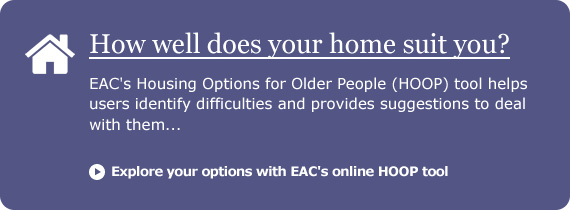What are they?
Housing-with-care, extra care housing, assisted living, retirement villages and retirement communities are terms used to describe new forms of retirement living where more services and facilities are provided than in traditional sheltered and retirement developments.
However discretely, all aim to offer a supportive environment in which people will be able to live safely and well as they age, and to call on additional support or care if and when they need this. Retirement villages represent the luxury end of this growing market, extra care tends to be for less affluent people who may already need the care and support on offer. Evidence suggests that housing-with-care environments can provide a home for life for most residents, substantially reducing the likelihood that they will ever need to move into residential care (a care home).
Facilities and services available
Common to all housing-with-care developments is that they have a cafe or restaurant serving at least one hot meal a day. Most also have communal space for exercise, hobby and leisure pursuits, buggy storage, hairdressing, and perhaps a small shop. Some have pools, cinemas or extensive grounds.
Developments vary considerably in the range of domestic and personal care services they offer. These may include practical help and support, domestic assistance, personal care, nursing care and emergency help.
- Practical help and support – most developments employ management staff whose role includes offering information, guidance and day-to-day support to residents.
- Domestic assistance such as help with housework and shopping is commonly available, sometimes as part of the standard package of services, sometimes as an add-on charged for separately. Personal laundry services are sometimes available, and in developments with a restaurant, a home meals delivery services might be offered.
- Personal Care includes assistance with dressing, eating, washing and toileting, as well as advice, encouragement and emotional and psychological support. Many developments have care staff on site, sometimes 24/7. In others, on-site management staff will arrange or facilitate care when required. Chiropody and physiotherapy services are also common.
- Nursing Care includes tasks normally carried out or supervised by a qualified nurse, such as administering medication and dressing wounds. Few housing developments have their own nursing staff, though some are built alongside a nursing home from which nursing care can be provided either in your own home, or through daily visits to, or temporary stays in, the nursing home.
- Emergency help – in all developments there are arrangements for summoning help in case of emergency. Pull cords are installed in each flat or bungalow, and residents can also opt to wear a pendant or wrist band with a call button. These basic user-triggered systems are referred to as carelines, social alarms and community alarms.
- End of life care – Watch a 10min DVD on end of life care provided in Housing & Care 21 extra care housing schemes: Is it that time already?. Visit the NHS website for more information on End of Life Care.

